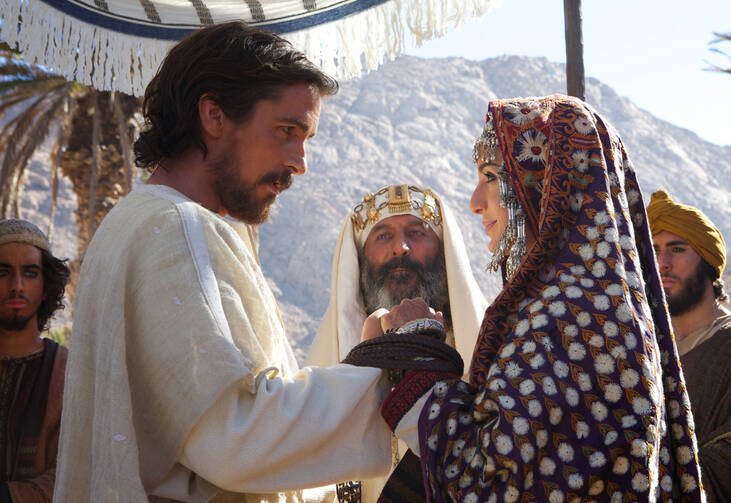When President Obama spoke to the nation of Nov. 20, making his case for taking executive action on immigration, he turned to Scripture: “we shall not oppress a stranger, for we know the heart of a stranger. We were strangers once, too.” Even those with little familiarity with the Bible did not have to be told the story behind this verse (Ex 22:20), a story of exile and freedom invoked by the president as a reminder that we are a nation of immigrants.
American or not, “It’s a book that lives in your imagination,” said Joel Edgerton (himself a Australian), who plays Ramses in the new biblical blockbuster, Exodus: Gods and Kings, in theaters Dec. 12. This is both a blessing and a curse for anyone who wants to adapt the well-known account of the Hebrew’s flight from Egypt for a new generation of moviegoers. On the one hand, there’s a reason this tale has been passed down and resonates through the millennia: it’s simply a great story. A people enslaved, an unlikely hero, divine wrath and redemption of epic proportions—it’s hard to craft this material into anything but a compelling narrative.
On the other hand, any director will face the twin pressures to somehow surprise viewers who already know the plot beginning, middle and end, while not giving offense to those for whom Scripture is not just prime screenplay fodder but the Word of God, the source of personal faith and religious identity.
In this regard, director Ridley Scott plays it relatively safely in “Exodus.” Scott, who shied away from calling himself an atheist—rather “a person very much not really believing”—told members of the religious press in a Dec. 8 meeting that his skeptical eye is in fact an advantage: at every stage he must convince first himself, then the viewer, of what he is portraying. There are no major fantastical deviations, such as the rock monsters that baffled viewers of Darren Aronofsky’s “Noah” earlier this year. “This is not Harry Potter,” said Scott, “this is real.” And it is the story of Exodus’ grounding in reality and history that gives Scott the room stick closely to the religious text while leaving room for alternative interpretations.
“Plagues could come from natural order or disorder,” said Scott, “or could come from the hand of God.” Likewise, in the scenes in which Moses is speaking to God, or rather God’s messenger (Malak), it appears to onlookers that he is talking to himself. He could really be talking to God, or, as Scott seems to be more inclined to believe, Moses “also could be talking to his conscience.” The film is not, however, “a two-hour Mythbusters episode,” according to Edgerton, who was raised Catholic and praised the film for tipping a hat to science while showing “respect for the religious aspect.”
Moses, played by Christian Bale, also inhabits a middle ground of sorts, somewhere between the reluctant leader, “slow of speech and tongue” (no speech impediments here, just a mildly off-putting array of ambiguous accents), and the confrontational prophet demanding Pharaoh to “Let my people go.” While Bale’s Moses has serious doubts about God’s plan for his people, and his own role in it, as a military leader he is perfectly self-assured. Significantly, he carries no staff, only a sword. Despite his brief stint in the desert as a shepherd, the man who returns to bring the Hebrews out of captivity is an army general through and through, training the Jews in the tactics of asymmetric war.
It was in this context that Bale said in an ABC News interview that Moses was “seen as a freedom fighter for the Hebrews, but a terrorist in terms of the Egyptian empire.” While his remarks raised the hackles of some religious commentators, it seems reasonable to take this more as a rather uncontroversial commentary on political violence than a jab at the Hebrew prophet. “If the Egyptian empire had the technology we have today they wouldn’t send chariots,” Bale added during the Dec. 8 interview, “they would send drones.”
Whatever one thinks of Bale’s characterization of Moses, it is because of plausible insights like these, seeing figures that have become familiar and safe in a new light, that recalling and retelling Biblical stories in every age is a worthwhile endeavor. In “Exodus” the God of the popular imagination—a bearded man, the voice of James Earl Jones—is left behind and we see Moses taking orders from a petulant British boy. Let’s just hope those leaving theaters this weekend thinking “Is that really in the Bible?” open the book and find out for themselves.








